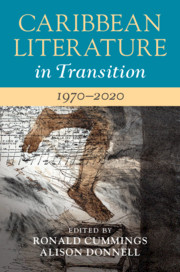Book contents
- Caribbean Literature in Transition, 1970–2020
- Caribbean Literature in Transition
- Caribbean Literature in Transition, 1970–2020
- Copyright page
- Contents
- List of Illustrations
- Contributors
- Acknowledgements
- Introduction: Caribbean Assemblages, 1970s–2020
- Part I Literary and Generic Transitions
- Chapter 1 Writing and the Responsibility to Memory: The Role of White Female Planters in Contemporary Caribbean Novels
- Chapter 2 Caribbean Identities and Diversifying the Creole Mix
- Chapter 3 Carnival, Calypso and Dancehall Cultures: Making the Popular Political in Contemporary Caribbean Writing
- Chapter 4 Life Writing, Gender and Caribbean Narrative 1970–2015: Itinerant Self-Making in the Postcolonial Caribbean
- Chapter 5 Forwarding Dubpoetry in this Generation: A Grassroots Performance and Neo-Literary Genre in Transition
- Chapter 6 Postcolonial Ruins, Reconstructive Poetics: Caribbean Urban Imaginaries
- Chapter 7 Reimagining Caribbean Time and Space: Speculative Fiction
- Chapter 8 Caribbean Drama and Performance
- Chapter 9 Here Are the Others: Caribbean Creative Nonfiction
- Chapter 10 ‘Let Every Child Run Wild’: Cultural Identity and the Role of the Child in Caribbean Children’s and Young Adult Fiction
- Part II Cultural and Political Transitions
- Part III The Caribbean Region in Transition
- Part IV Critical Transitions
- Bibliography
- Index
Chapter 5 - Forwarding Dubpoetry in this Generation: A Grassroots Performance and Neo-Literary Genre in Transition
from Part I - Literary and Generic Transitions
Published online by Cambridge University Press: 16 December 2020
- Caribbean Literature in Transition, 1970–2020
- Caribbean Literature in Transition
- Caribbean Literature in Transition, 1970–2020
- Copyright page
- Contents
- List of Illustrations
- Contributors
- Acknowledgements
- Introduction: Caribbean Assemblages, 1970s–2020
- Part I Literary and Generic Transitions
- Chapter 1 Writing and the Responsibility to Memory: The Role of White Female Planters in Contemporary Caribbean Novels
- Chapter 2 Caribbean Identities and Diversifying the Creole Mix
- Chapter 3 Carnival, Calypso and Dancehall Cultures: Making the Popular Political in Contemporary Caribbean Writing
- Chapter 4 Life Writing, Gender and Caribbean Narrative 1970–2015: Itinerant Self-Making in the Postcolonial Caribbean
- Chapter 5 Forwarding Dubpoetry in this Generation: A Grassroots Performance and Neo-Literary Genre in Transition
- Chapter 6 Postcolonial Ruins, Reconstructive Poetics: Caribbean Urban Imaginaries
- Chapter 7 Reimagining Caribbean Time and Space: Speculative Fiction
- Chapter 8 Caribbean Drama and Performance
- Chapter 9 Here Are the Others: Caribbean Creative Nonfiction
- Chapter 10 ‘Let Every Child Run Wild’: Cultural Identity and the Role of the Child in Caribbean Children’s and Young Adult Fiction
- Part II Cultural and Political Transitions
- Part III The Caribbean Region in Transition
- Part IV Critical Transitions
- Bibliography
- Index
Summary
Contending with Kei Miller’s declaration in ‘A Smaller Sound, A Lesser Fury: A Eulogy for Dub Poetry’ that the genre has died, this essay uses the lens of transition to demonstrate the continued vitality of this Jamaican-rooted performance and neoliterary genre that serves political and aesthetic needs of the variously disempowered. The essay suggests Miller misconceives what dubpoetry is, threatening its vital social work and doing a disservice to the older generation of dubpoets and their inheritors. Providing evidence that the majority of first-generation dubpoets continue to create new work, collaborate, develop new subgenres, and teach, the essay offers close readings of work by dubpoetry’s heirs. Jamaican dubpoetry band The No-Maddz, Jamaican-British spoken word poet Raymond Antrobus and Canadian dub inheritors Klyde Broox, d’bi.young anitafrika and Kaie Kellough are shown to effect presentational, generic, thematic/political and media transitions in and from dubpoetry.
- Type
- Chapter
- Information
- Caribbean Literature in Transition, 1970–2020 , pp. 85 - 101Publisher: Cambridge University PressPrint publication year: 2021

